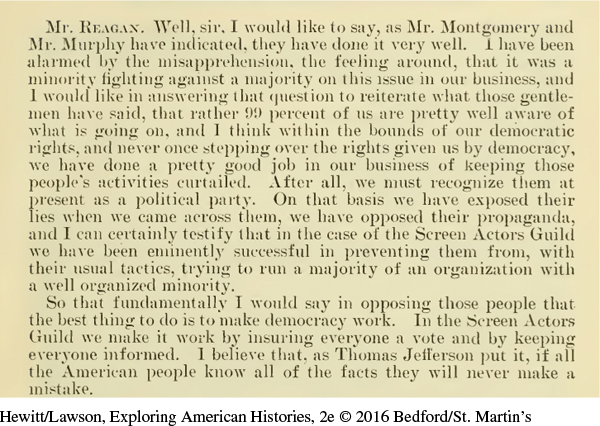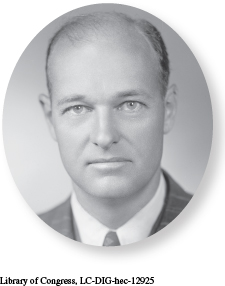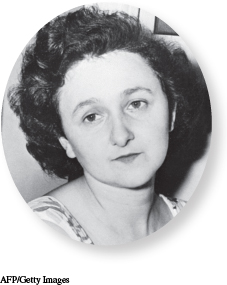Introduction to Chapter 24
24
The Opening of the Cold War
1945–1961
WINDOW TO THE PAST
Ronald Reagan Testimony before HUAC, 1947
During the Cold War with the Soviet Union, the United States became preoccupied with searching for and punishing Communists at home. In 1947 the House Committee on Un-American Activities investigated alleged Communism in Hollywood. The committee heard the testimony of Ronald Reagan, the president of the Screen Actors Guild, who declared that his organization had successfully countered Communist influence. To discover more about what this primary source can show us, see Document 24.5.

LEARNING OBJECTIVES
After reading this chapter you should be able to:
Explain the origins of the Cold War.
Identify how the overall strategy of containment changed between 1948 and 1953, and explain in particular how the Korean War affected U.S. Cold War strategy and presidential power.
Analyze the effects of the Cold War on domestic policy.
Evaluate how the Eisenhower administration managed containment throughout the world.
AMERICAN HISTORIES

George Frost Kennan played a critical role in shaping the postwar confrontation between the United States and the Soviet Union. Kennan’s views were based on extensive experience with the Soviets gained during two tours of duty at the U.S. Embassy in Moscow. During the first, from 1933 to 1937, he witnessed countless “enemies of the state” arrested, exiled, or executed in Stalin’s purges. His experiences convinced him that there was little basis for a positive relationship between the United States and the Soviet Union.
Kennan’s second tour of duty in Moscow, from 1944 to 1946, came at a critical juncture in U.S.-Soviet relations. As the war drew to a close, tensions over the nature of the postwar world escalated, and by 1946 the wartime alliance had collapsed. Against this backdrop, Kennan warned that Stalin was committed to expanding communism throughout the world and advised President Harry S. Truman to adopt a policy of containment. In Kennan’s view, all Soviet efforts at expansion should be met with firm resistance. At the same time, the United States should take an active role in rebuilding the economies of war-torn Western European countries, thereby reducing the appeal of communism to their populations. Kennan’s concept of containment would become the basis for President Truman’s Cold War foreign policy.
Kennan, however, was not a rigid cold warrior. He soon insisted that his containment strategy had been misunderstood. As the Cold War intensified and expanded, Kennan argued that containment would work best through political and economic rather than military means. Increasingly, his views fell out of favor at the State Department, and Kennan left in 1950 in a disagreement with the Truman administration’s growing militarization of the conflict with the Soviet Union.

Julius and Ethel Rosenberg were casualties of the Cold War that Kennan helped shape. Accused of passing military secrets to the Soviet Union, they were tried for espionage in an atmosphere of growing anti-Communist fervor. Like other young idealists during the 1930s, Ethel became disillusioned with capitalism, joined the Young Communist League, and took part in labor union organizing in her hometown of New York City. Julius attended the City College of New York, where he, too, joined the Young Communist League. Three years after they met in 1936, Julius and Ethel married and started a family.
During World War II, Julius worked for the Army Signal Corps as an engineer. In 1945 he lost his job after a security investigation revealed his Communist Party membership. Five years later, the federal government charged that during World War II the Rosenbergs had provided classified information about the construction of the atomic bomb to the Soviet Union, charges they denied.
A jury found them guilty on April 5, 1951, and the presiding judge sentenced them to death. Despite an international campaign for clemency and after unsuccessful appeals to the Supreme Court, on June 19, 1953, the Rosenbergs were executed. Though recent evidence has confirmed Julius Rosenberg’s role as a spy, the case against Ethel remains inconclusive. Without the heightened Cold War climate that then existed in the country, it is likely that neither would have gone to the electric chair.
The American histories of both George Kennan and Julius and Ethel Rosenberg revolved around their views of communism and the Soviet Union. Kennan designed an approach to containing Soviet aggression based on his dealings with Stalin. The Rosenbergs believed in communism’s promise of social and economic equality and saw the Soviet Union as a defense against Nazi aggression. The lives of Kennan, the Rosenbergs, and all Americans would be profoundly shaped by the epic military and ideological battle between the superpowers as the Cold War expanded from the late 1940s through the 1950s, bringing with it increased interventions abroad, fear of communism within the United States, and changes in the executive power of the presidency.
Exploring American HistoriesPrinted Page 789
Exploring American Histories Value EditionPrinted Page 580
Chapter Timeline